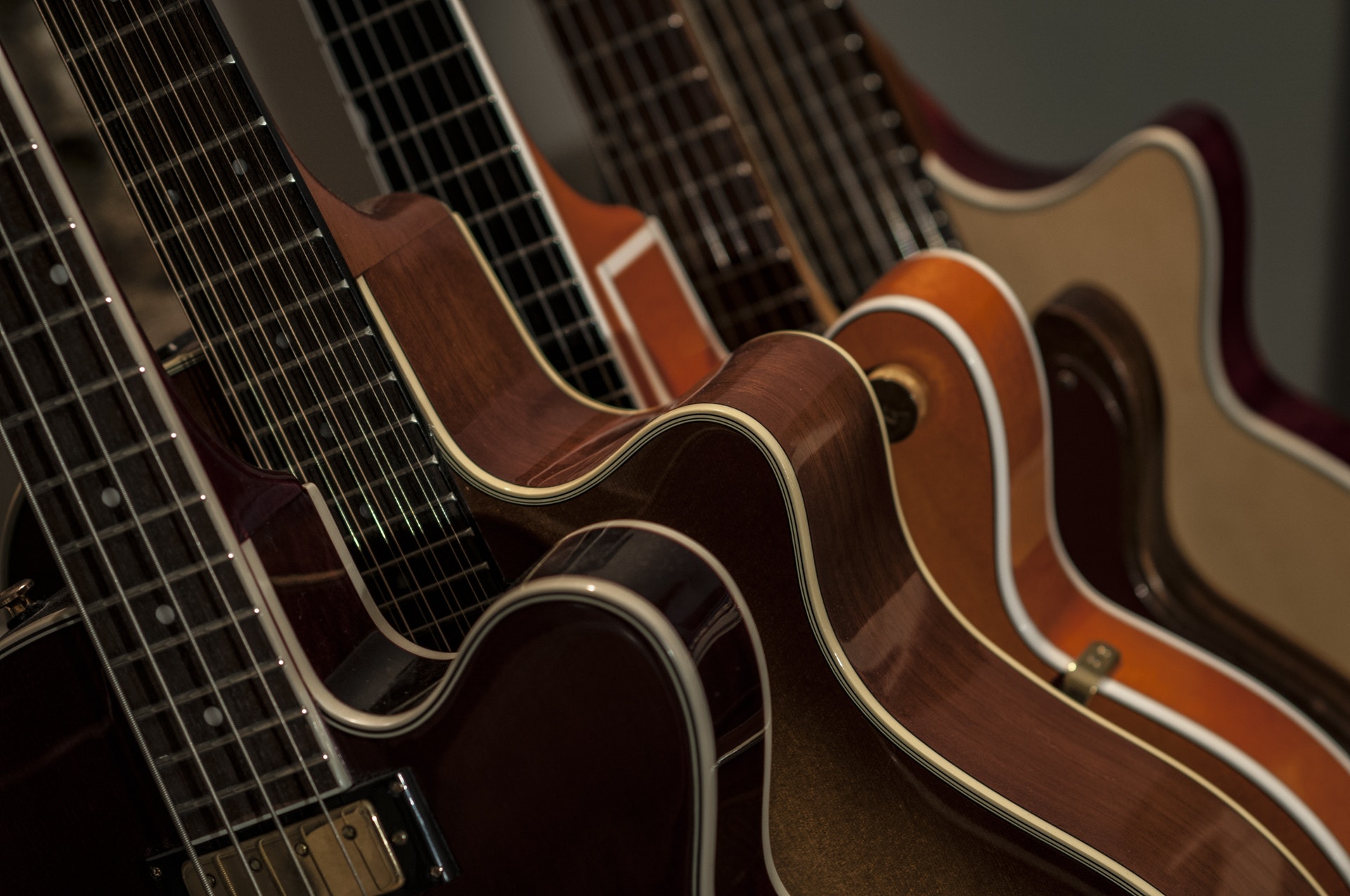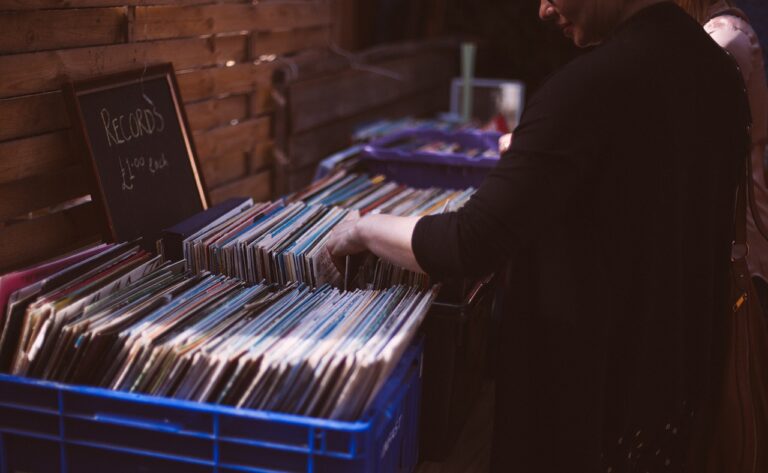Why Do Guitarists Have So Many Guitars?
Guitarists rarely stop at one. This truth goes for gigs, replacement band members, and especially for guitars. For ambitious musicians, seldom is their first instrument their last.
So, why do guitarists have so many guitars? There are many factors at play. First, the temptation of new gear is strong in the guitar community. Furthermore, it doesn’t take long for many to outgrow their “training” guitar.
However, there are plenty more reasons that guitarists go down the rabbit hole of more, more, and more. Read on to learn why guitarists wind up with so many instruments in the first place.
How Many Guitars is Average?
Personally, I only own four guitars (counting a bass). Evidently, this is a meager number compared to the average guitarist, who owns seven or eight.
Unfortunately, most censuses don’t poll people on how many guitars they own. So instead, the “seven or eight” figure is based on anecdotal evidence. Likely, the ones most proud of their collections are the ones who report.
However, we estimate that the average number of guitars to own is one. A lot of people set music-related goals because of the benefits. For example, many people have heard that learning a new instrument boosts brain function.
But, alas, distractions happen. Non-essential plans get put on the back burner. Thus, while many people may purchase a guitar to learn how to play, few get far enough to warrant getting a second (and third, fourth, etc.)
How Many Guitars Do You Need?
The number of guitars you need is something only you can answer. But with a few added words, we can provide a numeric estimate. For example:
How many guitars do you need to survive? Technically zero. Maybe one?
How many guitars do you need to build your skills? One.
How many guitars do you need when gigging? At least two. If the worst happens, you need a trusty backup!
How many guitars do you need to build a collection? Of course, the number that constitutes a collection varies depending on who you ask — but it’s most often between three and five. Usually, you enter “collection” territory when your reasoning for buying another guitar is, “why not?”.
Can You Have Too Many Guitars?
If you beg for an extension on your rent because your new Les Paul put you a little short this month, you might have too many guitars. But, generally, if you must forego essential spending to accommodate your guitar-buying habit, you’ve crossed the line.
Secondly, if you need to start putting guitars on your guest room bed because there’s nowhere else they can go, then you may have too many.
In summary, you can only have too many guitars when there isn’t enough money or space. But there really is no limit if you have no constraints in those areas.
Benefits of Having Multiple Guitars
While having over two or three guitars may seem excessive, there are numerous advantages. Are they worth the cost? Maybe. Let’s take a look at some common reasons.
1) You can have each guitar set to a different tuning
When you experiment with different musical genres, you’ll encounter many alternatives to the standard E-A-D-G-B-E tuning. Retuning a guitar every time you pick it up to play is a pain. With multiple guitars, all you need is three seconds to swap to a different instrument.
2) It’s easy to switch between different string gauges.
If you have one guitar, you’ll need to completely replace the existing strings if you need something lighter or heavier. However, having multiple guitars saves hours of painstaking labor.
3) You can play how you want when you want.
If you’ve optimized your guitar for Eric Clapton, but suddenly have an itch to play death metal, there are no quick solutions.
Owning several guitars allows you to tweak each one to a specific type of music. Then, if you feel like playing something else, you just pick up the right guitar for the job and resume jamming.
Different Types of Guitars
A big reason guitarists end up with so many guitars is because different guitars do different things. For hard rock and heavy metal, an electric guitar is a must. For pop and folk music, you’ve got to have an acoustic.
Not to mention, there is a type of guitar entirely devoted to one kind of music. Plus, a bass guitar is a crucial instrument for most musical genres.
Let’s explore what each type of guitar does, and why guitarists tend to end up with all of them.
Electric Guitar
An electric guitar is the MVP for hard rock solos, edgy metal riffs, and has crept its way into the instrumental forefront of country music. When paired with the right amp, an electric guitar delivers a powerful sound that is hard to match.
Arguably, the most significant selling point of an electric guitar is its versatility. You can pair one with peripherals like effects pedals, distortion knobs, and preamps. Nowadays, you can even use smartphone apps to tweak the sound.
Thus, if you want a clean, acoustic-like tone, you can do that. If you desire something dirty and aggressive, you can achieve that with an electric guitar, too.
Acoustic Guitar
The acoustic guitar is the world’s most popular instrument. Despite being over 100 years old, this instrument remains popular in modern music, including pop, folk, rock, jazz, and more.
Why would a guitarist buy an acoustic guitar, especially if they already have an electric? Because acoustic guitars are straightforward. You don’t need to purchase an amp to be able to hear it. Additionally, you don’t need an outlet nearby to play graceful tunes.
While an electric guitar can produce clean, twangy tones, it isn’t the same. There is an irreplicable element of an acoustic guitar’s sound. For many guitarists, this makes owning one a must.
Classical Guitar
Like acoustic guitars, classical guitars don’t need electricity to make music. They also look very similar to an acoustic guitar and have hollow wooden bodies.
The difference is that a classical guitar has a more mellow sound, thanks to nylon strings (or gut strings, if you’re old-fashioned). Again, their sound is unique and hard to replicate on other instruments. This is mainly because acoustic and electric guitars have metal strings, which are chemically destined to be hard and twangy.
Classical guitars offer the most soothing tone you can get. Many, myself included, feel that they’re reminiscent of harps. If an overdriven electric guitar represents one end of the musical spectrum, a classical guitar represents the other.
So, naturally, you gotta have one.
Bass Guitar
While some will argue that a bass guitar isn’t an actual guitar, it’s worth mentioning. Once you learn to play a “normal” guitar, picking up the bass is a logical next step. Plus, learning the bass is an easy way to call yourself a multi-instrumentalist.
Bass is the foundation of most music. From the orchestra to a modern rock band, at least one bass guitar rumbles somewhere in the background. Because it’s such a critical instrument, many guitarists feel obligated to learn the basics of bass.
Fortunately, a bass guitar has the same tuning as a regular guitar — but with thicker strings. Thus, learning the fundamentals of the acoustic guitar also advances one’s ability to play bass guitar.
Consequently, guitarists add bass guitars to their collection because:
- They’re (relatively) easy for guitarists to play,
- Bass guitars offer a unique musical experience.
Is One Guitar Enough?
For some people, one guitar is plenty to jumpstart their musical journey. Meanwhile, guitar veterans cannot imagine life with anything fewer than twenty guitars.
The answer to “is one guitar enough” depends on the individual. Furthermore, it depends on what your musical goals are.
Consider:
- How invested will you be as a guitarist?
- Is your guitar part of a hobby or a career?
- What musical styles do you hope to explore?
Of course, these are just a few examples of what to ask yourself. Ultimately, only time will tell for sure. It’s best to start off with one guitar and see where it takes you.
If you end up being happy as a casual player who can play a few campfire songs, then one trusty acoustic is certainly enough. However, if you decide that you’d like to take your hobby a step further – like playing a few live gigs – one guitar will certainly feel limiting.
Conclusion
Needing a separate guitar for a specific type of music, the thrill of new gear, and the freedom of having specialized instruments are the primary reasons guitarists have so many guitars.
After all, there’s a reason that the average guitarist has a well-stocked musical arsenal. There are surprisingly legitimate reasons for owning several. Many beginning guitarists may think anything above one is too many, only to become one of those people they previously dubbed as “having an obsession.”
Finally, for those who devote their lives to the instrument, spending their discretionary income on guitars brings immeasurable benefits. Each guitar offers a unique sound and feel, and the freedom to choose between them is a satisfying luxury.






